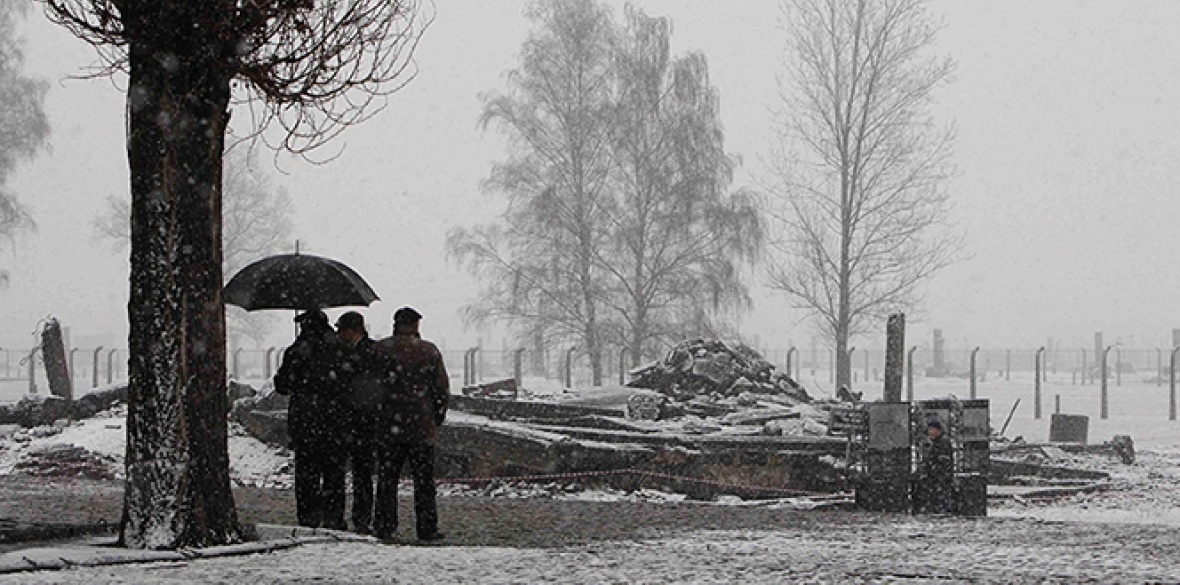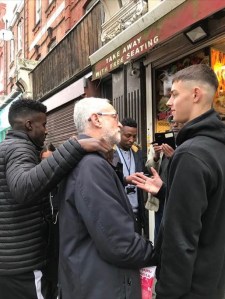Political manipulation of history and exceptionalising of antisemitism as a shield for Israeli war crimes are having a harmful effect on the fight against all racism, and fuelling a cynicism that’s especially dangerous in today’s world, argue Julia Bard and David Rosenberg

On 27th January 1945, Soviet soldiers liberated the 7,500 prisoners remaining alive in the massive complex of camps that constituted Auschwitz in southern Poland: the main camp, (Auschwitz I); the death camp, Birkenau (Auschwitz II); the slave labour camp, Monowitz (Auschwitz III); and seven Auschwitz sub-camps. Besides Auschwitz, there were six other killing centres across Poland, and other methods of murdering people en masse were used across a much wider region. These included mobile gas vans, mass shooting and forcing Jews into buildings then setting fire to them.
The single word “Auschwitz” has come to be used as shorthand for the entire Nazi project, a totalitarian empire based on a pernicious racial theory, ultra-nationalism, and the dismantling of democracy. The anniversary of its liberation has been designated Holocaust Memorial Day (HMD) since 2000, when representatives of 46 governments around the world met in Stockholm to discuss Holocaust education, remembrance and research, culminating in a declaration committing all of them to preserving the memory of those who were murdered in the Holocaust.
The Nazis pitilessly persecuted many groups, including Black, Gay and Slavic people, Jehovah’s Witnesses, trade unionists, communists, Freemasons and so-called “asocials”, who suffered incarceration, mistreatment, starvation and slavery. But they singled out the Jews and the Gypsies (Roma and Sinti) for extermination. The industrial-scale murder of these two peoples had its origins in Aktion T4, the euthanasia programme that started in 1939, experimenting with techniques for mass killing on disabled people in order to eliminate what the Nazis called “life unworthy of life”.
This year, which marks both the 80th anniversary of the Red Army’s arrival at those iconic gates and the 30th anniversary of the mass slaughter of Bosnian Muslims in Srebrenica, there are some ghostly silences around the commemorations. The survivors who were direct victims of the Holocaust, have almost died out. They can no longer testify to how they, their families and communities were labelled, marginalised, designated as “outside the nation”, discriminated against, stripped of their rights and dehumanised as a prelude to the attempted extermination. That testimony is so pertinent to the experiences of minorities today as the far right gains strength across the world and political power in several countries.
But there is also another eerie silence. From the outset – and this is written into the Stockholm Declaration – there has been a commitment to remember all victims of Nazi persecution, and victims of all genocides. In 2025, the focus is on Darfur, but although the official HMD materials also feature Cambodia, Rwanda and Bosnia, there is no mention of the genocide in Gaza, enacted with weapons and support provided by our government among others.
This is a highly sensitive issue for the Holocaust Memorial Day Trust (HMDT), a UK government-funded charity set up in 2005 to support schools, local authorities and other organisations holding events. They, along with various governments and leading Jewish institutions, have aligned with a particular narrative that is being perpetrated by a Zionist movement in crisis. Although Israel’s actions in Gaza have been recognised as “consistent with genocide” by the UN, Amnesty International, Human Rights Watch and the International Court of Justice, the HMDT sidestep this by saying that, along with the victims of the Nazis, they commemorate “the more recent genocides recognised by the UK government, and the genocide in Darfur.” Of course, if our government recognised Gaza as a genocide, it would be tantamount to referring themselves to the International Court of Justice for complicity, by selling arms to Israel.
Any deep, nuanced understanding of the Holocaust, which would be a resource for every minority threatened by the current rise of racism and fascism, is being undermined and subsumed under a singular interpretation of antisemitism, which exceptionalises it and prioritises the fight against it above all others. Instead of challenging all forms of racism, and understanding their connections, this imperative argues that antisemitism is an eternal truth, not susceptible to challenge, and fundamentally different from other forms of racism and persecution.
The political weaponisation of antisemitism is an extreme expression of two planks of Zionist ideology: that Israel rose out of the ashes of the Holocaust and, because of that, must be protected at all costs; and that the Holocaust itself was an inevitable end to Jewish life as a diverse diaspora people. This transparently instrumental use of antisemitism as a shield for Israeli war crimes is creating a gulf between many Jews and people from other minorities who have naturally, out of antiracist motives, moved to defend and support the Palestinian people. The growing number of Jews who identify with the Palestinians are themselves, absurdly, labelled antisemites or friends of antisemites by right-wing Zionists.
There have been several worrying responses to this. One is growing indifference to what Jews have suffered. Another is paralysis or silence, for fear of being unjustly tainted with antisemitism. A third is cynicism about actual, continuing antisemitism, resulting in some wrong-headed calls to boycott HMD or set up counter-events which focus solely on Gaza and diminish the significance of the Nazi genocide. This pitting of genocides against each other in a league table of oppression misunderstands how such systems of violence are generated. Characterising histories of oppression as “belonging” solely to atomised groups of victims, sabotages the strategies of solidarity and collaboration we need to challenge them.
Professor Michael Rothberg offers a more fruitful approach, saying that collective memories of persecution don’t compete in a zero-sum game to “crowd each other out of the public sphere”. Instead, they raise consciousness of the experiences of other peoples. He argues that “collective memories of seemingly distinct histories – such as those of slavery, the Holocaust, and colonialism – are not so easily separable from each other.” He draws on the work of the African American writer and activist, W E B du Bois, who visited Warsaw in 1949 and saw the total destruction the Nazis had wreaked on the ghetto after suppressing the uprising there in April 1943.
In his article, “The Negro and the Warsaw Ghetto”, du Bois wrote that the insight he gained from seeing the ruins “was not so much clearer understanding of the Jewish problem in the world as it was a real and more complete understanding of the Negro problem. … the problem of slavery, emancipation, and caste in the United States was no longer in my mind a separate and unique thing as I had so long conceived it.” Rothberg says that this “vision brings black and Jewish histories into relation without erasing their differences or fetishizing their uniqueness.”
The insights of Marek Edelman, Second in Command in the Warsaw Ghetto Uprising. which du Bois had understood with such depth and clarity, speak directly to the current dangerous political moment. Edelman, a lifelong Bundist (Jewish socialist) and outspoken opponent of Zionism and nationalism in general, lived in Poland until his death in 2009.
He was incandescent at the attempts by successive Israeli governments of the 1950s and ’60s to usurp that heroic uprising – which he described as a fight “for dignity and freedom” – and attempt to harness it to the fight to establish an independent Jewish State in Palestine five years later. He challenged Israeli politicians, academics and museum curators who sought to nationalise and claim sole ownership of the memory of the Holocaust by reminding them that: “In 1943 we fought for the life of Jewish society in Warsaw… not for territory, and not for a national identity.”
Edelman insisted that there were no nationalist lessons to be drawn from the Holocaust, only general lessons for humanity. And he asserted forcefully that the memory of the Holocaust did not belong to the Jews but to everybody.
It was precisely his internationalist and anti-nationalist understanding of those general lessons for humanity, that led him to join an aid convoy to Bosnia during the Yugoslav wars in the 1990s. No matter who the perpetrators were, he was there to support the victims unconditionally.
In 2025, when far right forces appealing to base nationalist impulses are gaining ground quickly in many countries, emboldened by centrist and hard right governments that promise harsher and harsher laws against migrants and refugees, it is vital for antiracists and antifascists to recognise that the opposite of nationalism is not just internationalism, but anti-nationalism. In the turbulent 1930s, when ultra-nationalism was rampant, not least in semi-fascist Poland, the Jewish Workers’ Bund that Edelman joined as a youth member published a manifesto that included the line: “Against antisemitism, against all manner of human hatred, against one’s own and foreign nationalism.”
Politicians will flock to Auschwitz this week to recycle their clichés about defending democracy and fighting evil; they will declare “Never again!” while their policies follow the agenda and fuel the growth of the far right. We have had the grotesque spectacle of Keir Starmer, camera crew in tow, posing for selfies at Auschwitz to underline his claimed commitment to fighting antisemitism. That very evening he met Polish politicians to confirm continued British co-operation with Poland’s cruel treatment of asylum seekers in the forests on the border with Belarus, to “protect” Europe from “infiltration” by migrants.
Anyone connected to a history of genocide has to face up to the most terrible realities and responsibilities. While the storm rages, people don’t fall neatly into clear categories of victim or perpetrator, challenger or witness. Today, ruthless, racist political leaders are again dismantling democratic mechanisms and trashing legal rights and protections. How we understand, address and memorialise our shared history will inform how effectively we challenge the progress of the far right and fascism today.
Photo: People shelter from the snow at Birkenau ahead of a memorial service to mark International Holocaust Memorial Day on the anniversary of the liberation of Auschwitz.
Julia Bard and David Rosenberg are members of the National Committee of the Jewish Socialists’ Group, and have helped to organise educational visits to Auschwitz.
This article was first published in the Morning Star on Monday 27th January.







